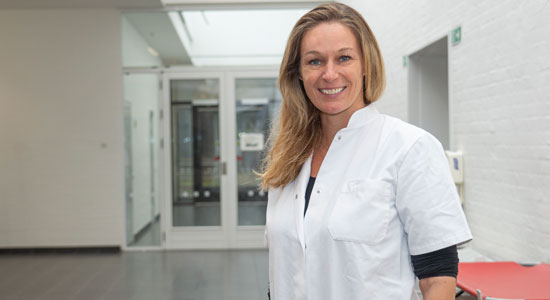Click here to read the curriculum in the course catalogue.
Course code: SCAM25049U
Advanced Clinical Dermatology
This course is a part of

The purpose of this course is to further develop the skills of the student within the discipline of veterinary dermatology in companion animals.
Specifically, there will be focus on the advanced approach to the allergic patient (food allergy, atopic dermatitis, flea allergy) as well as certain autoimmune skin diseases, including the pemphigus complex, lupoid diseases and sebaceous adenitis.
Further, an approach to feline skin diseases will be addressed. The level of prior knowledge and skills within dermatology from both veterinary candidate level and the first two modules of the master-education will be advanced further.
By theory and practical exercises, the participant’s knowledge, professional skills and competences will be extended within the subject of companion animal clinical dermatology.
Read more about the specialisation tracks and the Master's programme on the main page:
Course Directors on Advanced Clinical Dermatology

Mette SchjærfAssociate Professor |
Course details on Advanced Clinical Dermatology
Dates and examination
Course dates 2026
9 -13 November 2026
Course dates 2028
13 - 17 November 2028
The course is available every second year.
Examination
Please find dates and details about the exam in the exam schedule.
Learning outcomes
Knowledge
Having completed the course, the student must be able to:
- Define, identify and discuss evidence-based decision making within advanced clinical dermatology.
- Explain, reflect about and demonstrate a complete overview of systematic clinical approach to the dermatological patient at an advanced level.
- List, classify, and demonstrate critical reflection on the most current and novel approaches to patient diagnosis, therapy, management at an advanced level of clinical dermatology using comparative aspects to human dermatology where applicable.
- List, classify and demonstrate critical reflection of research methods, research study design and research presentation in specialised scientific veterinary and human journals concerned with clinical dermatology.
Skills
Within the area of clinical dermatology, the graduate must be able to:
- Evaluate and manage specialized dermatological cases and have a solid understanding of applied treatment protocols.
- Continuously seek out, reflect on and apply new evidence based methods and solution models within veterinary- and human dermatology where applicable.
- Work systematically and effectively in the specialisation area, having knowledge and understanding of the area at a high international level.
- Master and apply advanced practice skills/tools in combination with theoretical knowledge such as preparation and evaluation of sampling procedures for cytological examination of different skin lesions, thorough assessment of cultures and sensitivity testing, advanced understanding of dermatohistopathology, IgE blood tests and CT evaluation of the ear canal.
Competences
Following the course, the candidate must be able to:
- Work independently, take responsibility for, predict, prognosticate and make decisions at an advanced clinical dermatological level using most current diagnostic and therapeutic methods.
- Collaborate constructively within and between specialists/professionals and lay persons involved in the discipline of clinical dermatology concerning patient management of specialized cases.
- Make ethical considerations regarding diagnostic methods and therapies and place these into perspective such as screening programs in cat and dog breeds at risk for genetic dermatological diseases.
- Communicate effectively verbally and in writing and be capable of discussing issues within the specialisation area with professional colleagues in private practice, in academia and in research institutions within the area of specialised clinical dermatology.
- Independently evaluate and structure own learning processes and continuously obtain new knowledge at a specialty level within advanced clinical dermatology.
- Take responsibility for the continuing education of staff working in the graduates own clinic to ensure a uniform advanced level of care
Admission criteria
You must meet the following criteria to be admitted to this course:
- Hold a degree in Veterinary Medicine
- Hold one of the following certifications
- DVA Certificate in Small Animal Diseases (equivalent to the 4 compulsory courses of the Master of Companion Animal Clinical Science)
- Swedish / Norwegian / Finnish specialist in diseases of dogs and cats
- Equivalent competences
- Have a minimum of 2 years of relevant work experience from companion animal practice
- Be proficient in English
Find detailed information about the formal requirements for this course.
Read more about admission on the main page of Master of Companion Animal Clinical Science.
Tuition fees
EU/EEA citizens*
Single course student: 33,500 DKK
Master student: 30,000 DKK
Non-EU/EEA citizens
Single course student: 37,740 DKK
Master student: 34,240 DKK
Tuition fees include course materials and lunch/coffee. Books are not included in the tuition fees and must be purchased by the participants.
*Citizens of the EU, EEA or Switzerland is entitled to a subsidised tuition fee, due to EU legislation, hence the difference in price.
Location
University of Copenhagen
University Hospital for Companion Animals
Dyrlægevej 16
1958 Frederiksberg
Denmark
Contact
Christine Gulstad
Study Administration Officer
lifelonglearning@adm.ku.dk
Tlf: +45 35 32 12 73
